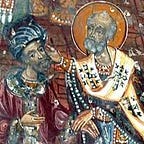Thanks for responding once more, I’m glad we can have this conversation. With respect to metaphysics within the Scriptures, you’re correct that the Bible isn’t intended to be a primarily philosophical text. However, there certainly are passages that give key philosophical ideas, such as John 1. Here are a few comments from Church Fathers on Exodus 3:14:
Ambrose of Milan: “The Lord said, ‘I am who I am.’ You will say, ‘He who is sent me.” This is the true name of God: always to exist.” He also writes, “Christ therefore is and always is, for He who is, always is.”
Augustine of Hippo: “Then too Plato’s definition of a philosopher — one who loves God — contains an idea which shines forth everywhere in Scripture…the answer received was ‘I am who I am…’ as though, in comparison with Him who, being immutable, truly is, all mutable things are as if they were not.”
Augustine of Hippo: “For although that immutable and ineffable nature does not admit of was and will be but only is (for it truly is because it cannot be changed).”
Augustine of Hippo: “For He truly is because He is unchangeable… He is the first and greatest existence, who is utterly unchangeable.”
Eusebius of Caesarea: “Everything that has ever existed or now exists derives its being from the One, the only existent and preexistent being, who also said ‘I am the existent.’”
Fulgentius of Ruspe: “The Holy Trinity…is likewise the only one by nature unchangeable. He indicates this when He says to His servant Moses, ‘I am which I am.’”
Hilary of Poitiers: “It is known that there is nothing more characteristic of God than to be, because that itself which is does not belong to those things which will one day end or to those which had a beginning.”
Jerome: “It must have been as the absolute being that God claimed for Himself that name of essence.”
John Chrysostom: “Now the words ‘he who is’ mean that He exists always and is without beginning and that He really exists and exists as Lord and Master.”
My point is, this interpretation is not something novel and shoehorned in by Aquinas and his followers (including me), but rather, quite a prevalent interpretation of those who dedicated themselves to the Scriptures and were closer to Christ temporally. You have to wonder why Church Fathers were largely Neoplatonists in the first place.
I don’t exactly understand how you’re comparing classical theism to Spinozist monism. Spinoza would say that we’re all modes of the same substance, but classical theists claim that we’re separate substances dependent on God, who is subsistent existence; we aren’t God, but we’re dependent on Him for our existence. Our traits of will, intellect, etc. all derive from God, and yes, so do concepts of being a reptile. This is simply a reflection of the principle of proportionate causality. However, the analogy is served because we cannot fully understand the Divine Nature, though we can know what it is by reason. We know that God has a will in a sense, but we don’t exactly understand what it’s like because His status as the efficient cause of all wills gives Him an infinitely more perfect will.
Also, we don’t claim that God is a person at all! God certainly is the source of personal traits, but He is not a person like we humans are. God is Being Itself. As far as I’ve concerned, showing that God has a will and intellect is enough to determine that He has personal qualities, though in a greater sense than we can understand.
Finally, my point that God doesn’t need to create but chose to shows that He certainly has a will and desire. I really don’t know how that’s a conflict.
Thanks again for your response!
